An early
Baptist dissenter who died in
London's Newgate Prison was
Thomas Helwys, who wrote in 1612:
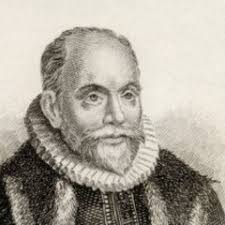
"The King is a mortal man, and not God, therefore he hath no power over the mortal soul of his subjects to make laws and ordinances for them and to set spiritual Lords over them."
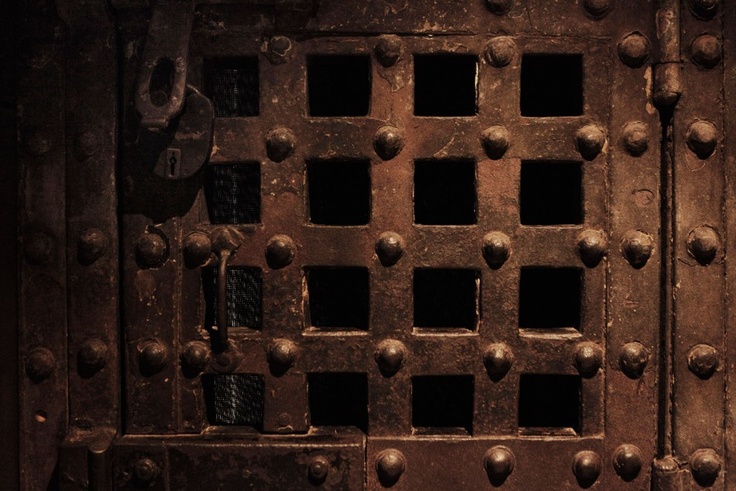 Thomas Helwys
Thomas Helwys founded the Baptist faith in England with
John Smyth and
John Murton.
Thomas Helwys wrote in
A Short Declaration of the Mystery of Iniquity:
"If the King's people be obedient and true subjects, obeying all humane laws made by the King, our lord the King can require no more:
for
men's religion to God is betwixt God and themselves; the King shall not answer for it, neither may the King be judge
between God and man."
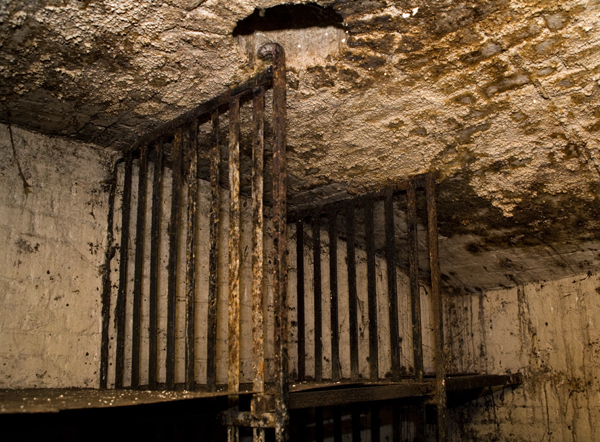 Baptist John Murton
Baptist John Murton was thrown in the
Newgate Prison where his opinions were censored for being against the government agenda.
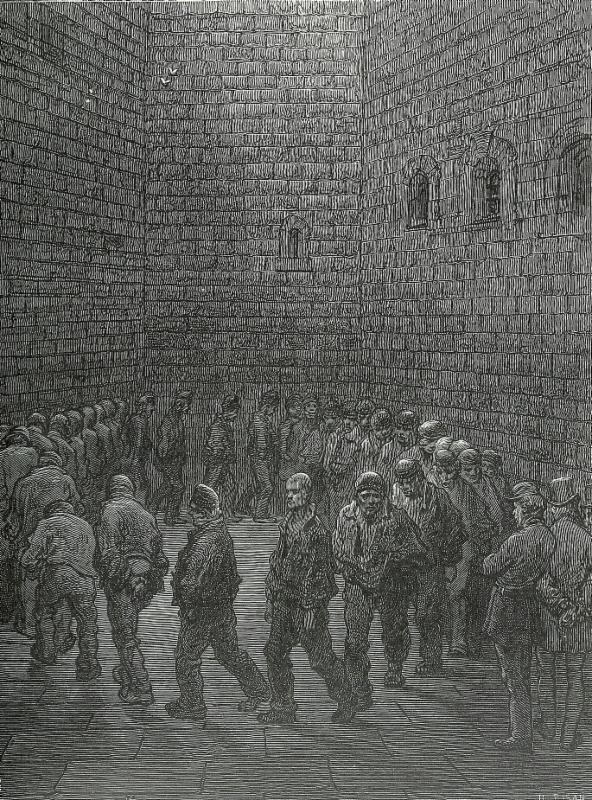 Roger Williams
Roger Williams referred to him in
The Bloody Tenet of Persecution For Conscience Sake:
"The author of these arguments against persecution ... being committed (a) prisoner to
Newgate for the witness of some truths of Jesus ...

... and having not use of pen and ink, wrote these arguments in milk, in sheets of paper brought to him by the woman, his keeper, from a friend in London as the stopples (corks) of his milk bottle ...
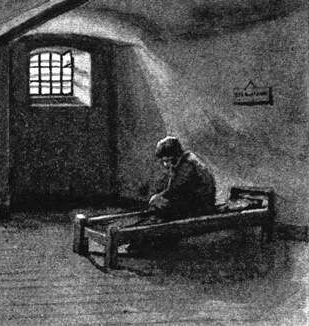
In such paper, written with milk, nothing will appear; but the way of reading by fire being known to this friend who received the papers, he transcribed and kept together the papers, although the author himself could not correct nor view what himself had written ...

... It was in milk, tending to soul nourishment, even for babes and sucklings in Christ ... the word of truth ... testify against ... slaughtering each other for their several respective religions and consciences."
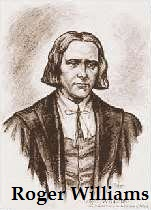 Roger Williams
Roger Williams was found guilty of preaching religious liberty in England.
When the government sought to arrest him, he fled to Boston, Massachusetts, on FEBRUARY 5, 1631.
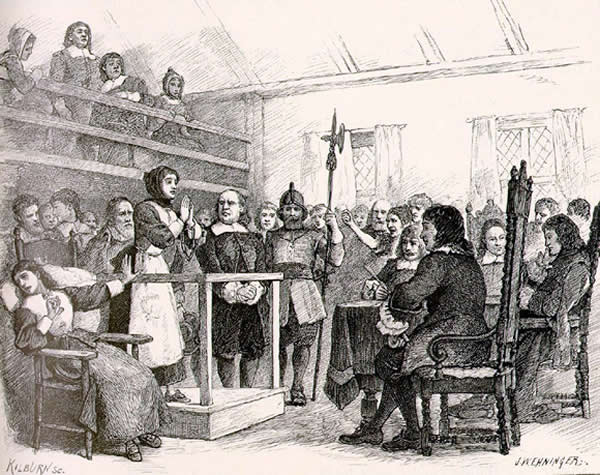 Puritans
Puritans in Massachusetts had begun
enforcing religious uniformity, similar to what they had fled from in England.
Supreme Court Justice Hugo Black wrote in
Engel v. Vitale, 1962:
"When some of the very groups which had most strenuously opposed the established Church of England found themselves sufficiently in control of colonial governments ... they passed laws
making their own religion the official religion of their respective colonies."
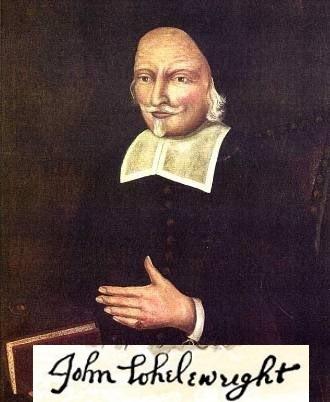
A controversy arose in Massachusetts between a
"covenant of grace" versus a
"covenant of works."
The "covenant of grace" leaders were
Sir Henry Vane, Rev. John Cotton, Rev. John Wheelwright and his sister-in-law,
Anne Hutchinson.

In 1637,
Rev. John Wheelwright fled Massachusetts and founded Exeter, New Hampshire.
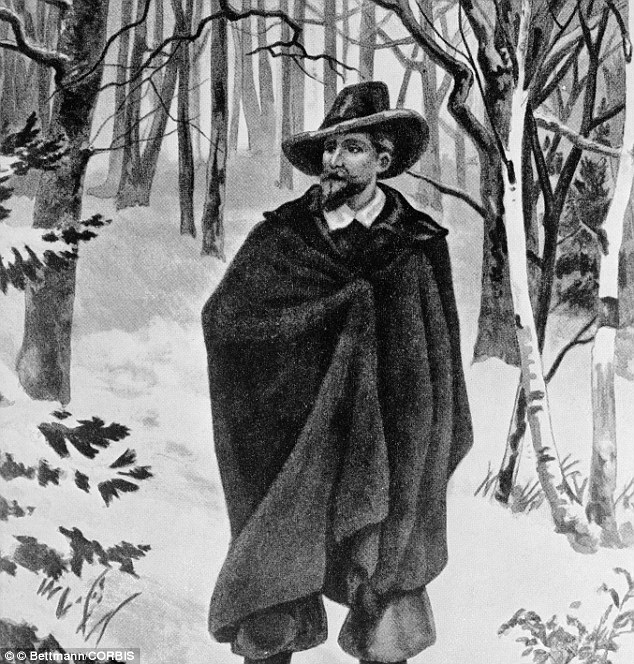 Roger Williams
Roger Williams pastored briefly before "notorious disagreements" caused the Massachusetts General Court to censor his religious speech.
Upon hearing the sheriff was on his way to arrest him in January of 1636,
Williams fled for weeks in the freezing winter.
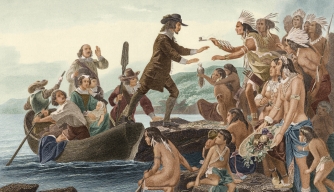
He was befriended by the Indians of Narragansett, where he founded
Providence Plantation, Rhode Island -- the first place
where church government was not controlled by state government.
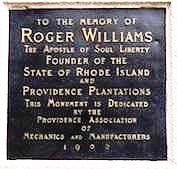
A historical plaque reads:
"To the memory of
Roger Williams, the
Apostle of Soul Liberty, Founder of the State of
Rhode Island and Providence Plantation."
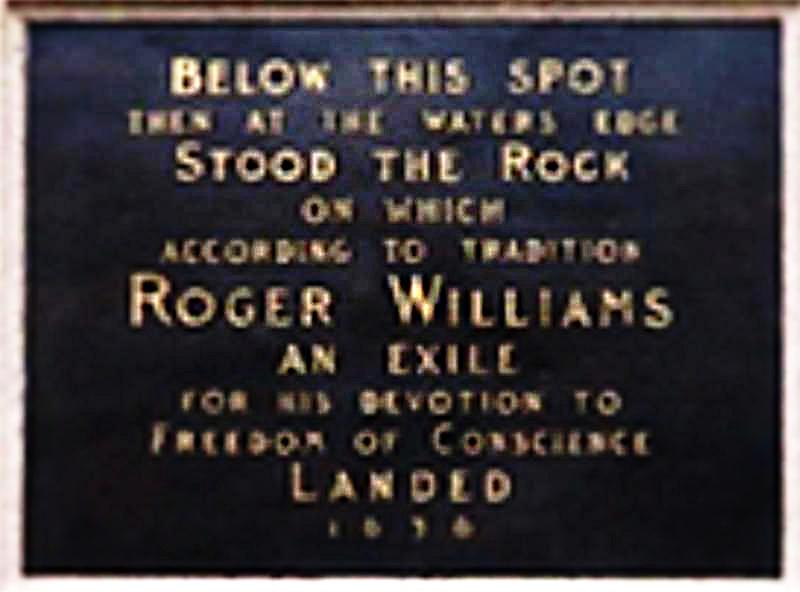
The reverse of the plaque reads:
"Below this spot then at the water's edge stood the rock on which according to tradition
Roger Williams, an exile for the
devotion to the freedom of conscience, landed. 1636."
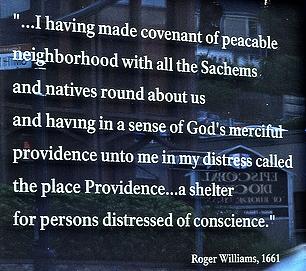 Roger Williams
Roger Williams wrote in 1661:
"I having made covenant of peaceable neighborhood with all the Sachems (Chiefs) and natives round about us, and having in a sense of
God's merciful providence unto me in my distress called the place Providence ...
a shelter for persons
distressed of conscience."
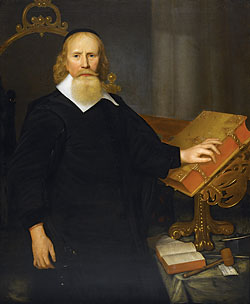
In 1638,
Roger Williams, with
physician John Clarke, organized the
first Baptist Church in America.
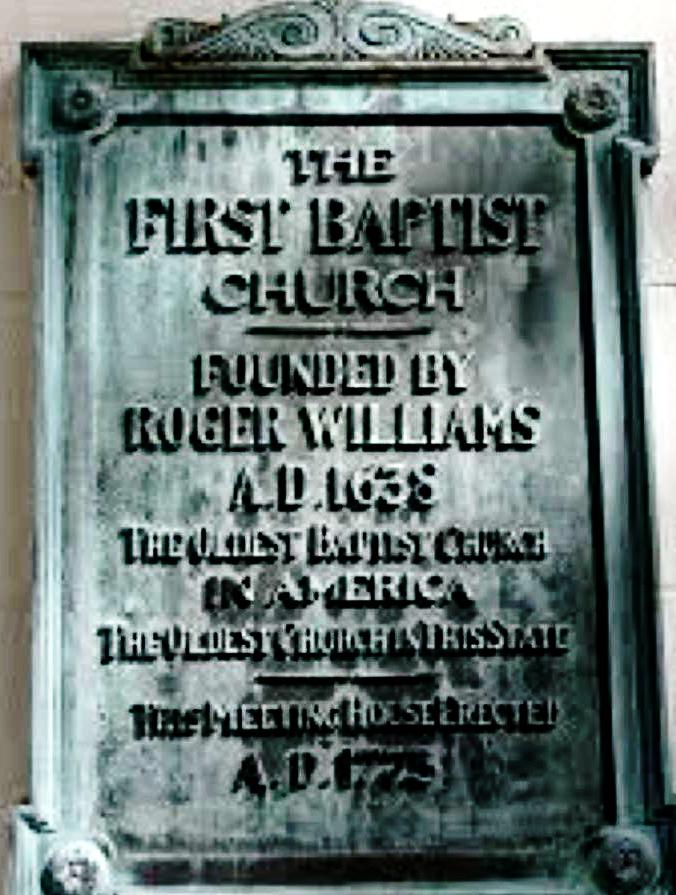
A plaque reads:
"The
First Baptist Church, Founded by
Roger Williams, AD 1638, The Oldest Baptist Church in America, The Oldest Church in this State."
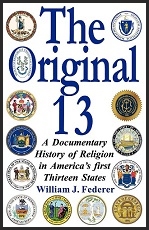 THE ORIGINAL 13 -A Documentary History of Religion in America's First Thirteen States
THE ORIGINAL 13 -A Documentary History of Religion in America's First Thirteen States
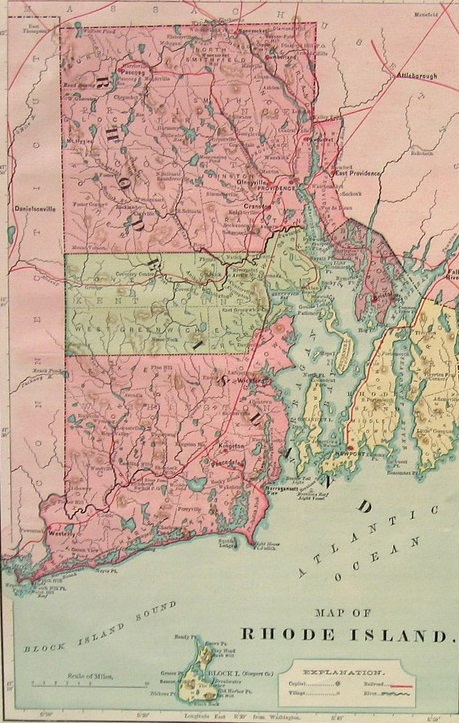
Soon other dissenters arrived in
Roger Williams' Rhode Island colony, such as
William Coddington,
Philip Sherman, and
Anne Hutchinson.
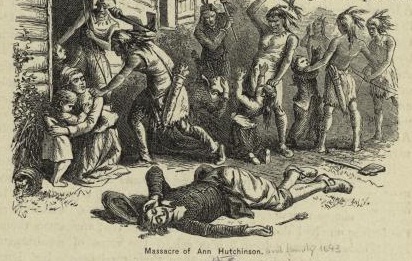
Anne soon left again to settle in the Dutch settlement of
The Bronx in
New York City, where all her family was scalped and beheaded by raiding Indians in 1643.
There was only one survivor,
Anne's nine-year-old daughter
Susanna, who was taken captive. After several years, she escaped and married inn-keeper Samuel Cole. Their descendants include three U.S. Presidents.
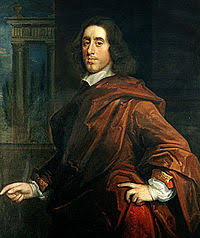 Sir Henry Vane
Sir Henry Vane was Governor of Massachusetts 1636-1637, where he helped found
Harvard and gave support to
Roger Williams.
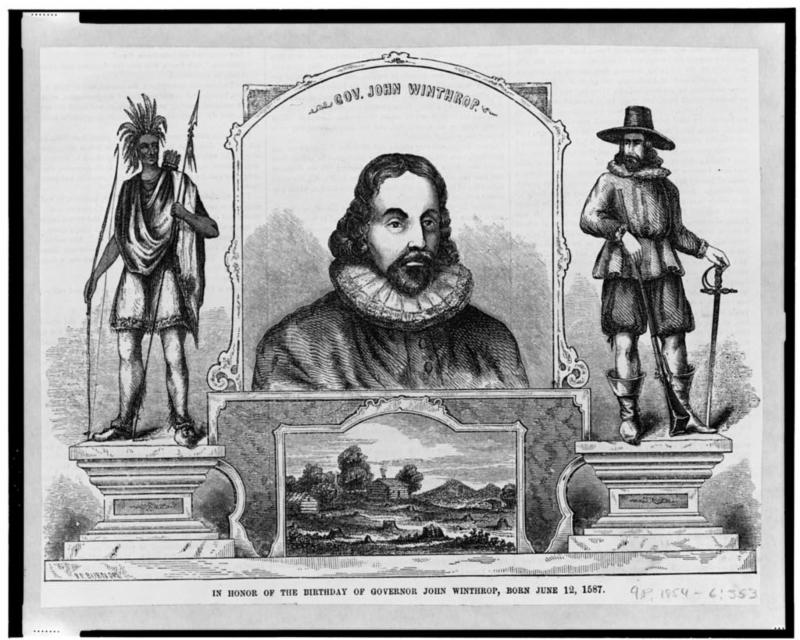
Due to the "covenant of grace" versus the "covenant of works" controversy,
Governor Sir Henry Vane was not reelected, being replaced by
John Winthrop.
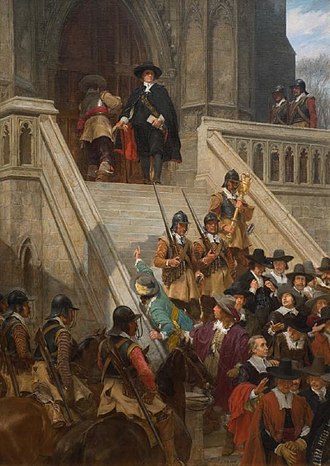
In 1639,
Sir Henry Vane returned to England where he backed the
Puritan Revolution, led by
Oliver Cromwell, though he did not support the Rump Parliament which beheaded Charles I.
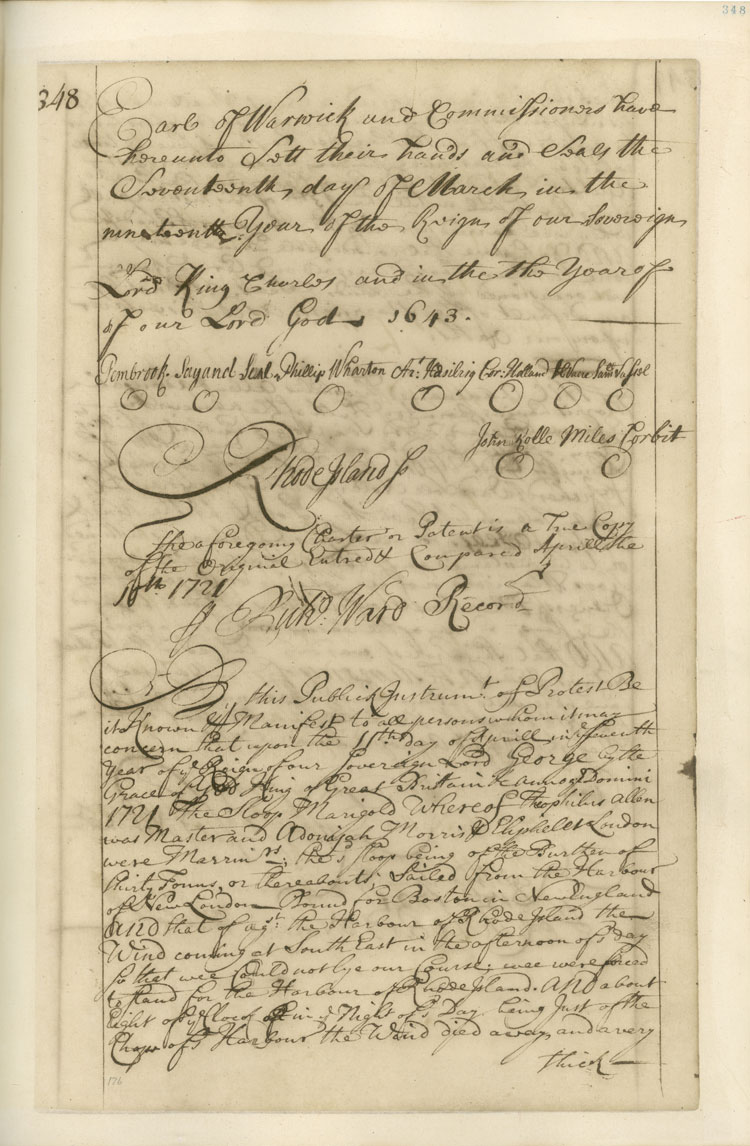
During the brief English Commonwealth,
Vane helped draft for
Roger Williams the
Patent for Providence Plantation, which was unique in
guaranteeing freedom of religion and
conscience. Vane later defended the Patent on behalf of
Roger Williams against a competing charter.
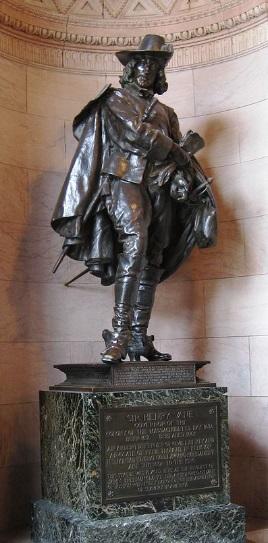 Roger William
Roger William wrote of Vane in April of 1664:
"Under God, the great anchor of our ship is
Sir Henry Vane ... an instrument in the hand of God for procuring this island."
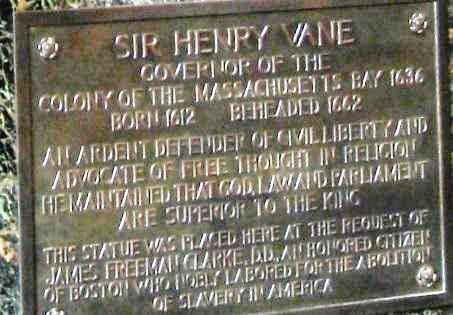
A statue of
Sir Henry Vane is in the Boston Public Library with a plaque that reads:
"Sir Henry Vane ... An ardent defender of civil liberty and
advocate of free thought in religion. He maintained that God, Law, and Parliament were
superior to the King."
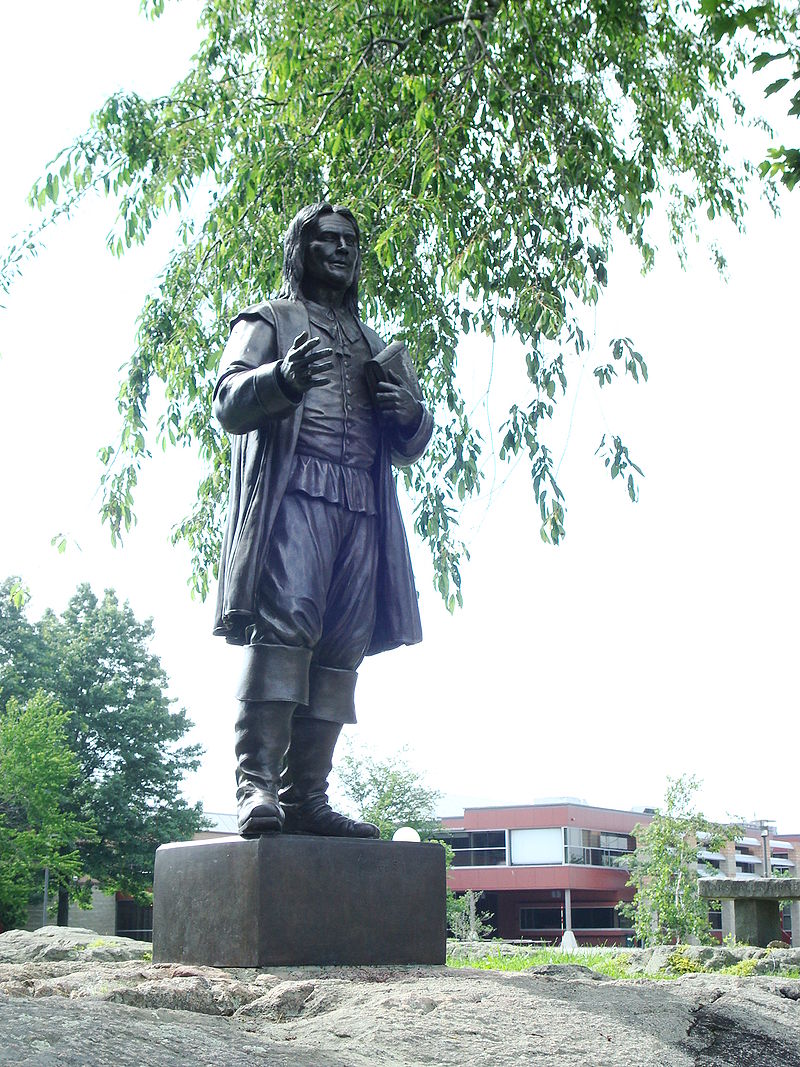
The
Plantation Agreement at Providence, September 6, 1640, stated:
"We agree, as formerly hath been the liberties of the town, so still, to hold forth
liberty of Conscience."
 The Government of Rhode Island,
The Government of Rhode Island, March 19, 1641, stated:
"The Government ... in this Island ... is a
Democracy, or Popular Government; that is to say, It is in the
Power of the
Body of Freemen orderly assembled."

In 1644,
Roger Williams wrote a response to
Puritan leader John Cotton's accusations.
It was published with the title
The Bloody Tenet (Practice) of Persecution for Conscience Sake and
Mr. Cotton's Letter Lately Printed, Examined and Answered in 1644.
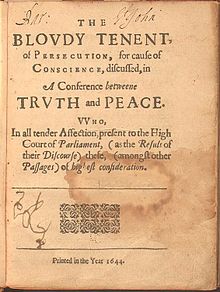
In it,
Roger Williams first mentioned his now famous phrase,
"wall of separation":
"Mr. Cotton ... hath not duly considered these following particulars.
First, the faithful labors of many witnesses of Jesus Christ, existing in the world, abundantly proving,
that the
Church of the Jews under the Old Testament in the type and the
Church of the Christians under the New Testament in the anti-type, were both SEPARATE from the world;

and that when they have opened a gap in the
HEDGE, or
WALL OF SEPARATION, between the garden of the CHURCH and the wilderness of the WORLD, God hath ever
broken down the WALL itself,
removed the candlestick, &c. and
made his garden a wilderness, as at this day.
And that therefore if He will ever please to
restore His GARDEN and paradise again, it must of necessity be
WALLED in peculiarly unto Himself
from the WORLD,
and that all that shall be saved out of the world are to be transplanted out of
the wilderness of the world and added
unto His Church or garden ...
a SEPARATION of Holy from unHoly, penitent from impenitent, Godly from unGodly."
 Roger Williams
Roger Williams was alluding to Isaiah 5:1-7, that when God's people sin, He judges them by allowing his vineyard, the church, to be trampled by an ungodly government, in the same way that when Israel sinned, God let ungodly foreigners invade and trample them.
"My well-beloved hath a
vineyard ... And he
fenced it, and gathered out the stones thereof, and planted it with the choicest vine ... and he looked that it should bring forth grapes, and it brought forth wild grapes.
And now, O inhabitants of Jerusalem ... judge, I pray you,
betwixt me and my vineyard ... When I looked that it should bring forth grapes, brought it forth wild grapes? ...

... I will tell you what I will do to my vineyard: I WILL TAKE AWAY
THE HEDGE thereof, and it shall be eaten up; and BREAK DOWN
THE WALL thereof, and it shall be trodden down ...
For the
vineyard ... is house of Israel ... and he looked for judgment, but found oppression."
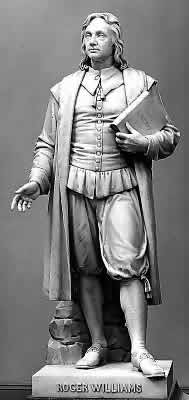 Roger Williams
Roger Williams also referred to the warning to the Church at Ephesus in the Book of Revelations, "
Repent and do the first works;
or else I will come unto thee quickly, and
will remove thy candlestick out of his place, except thou repent."
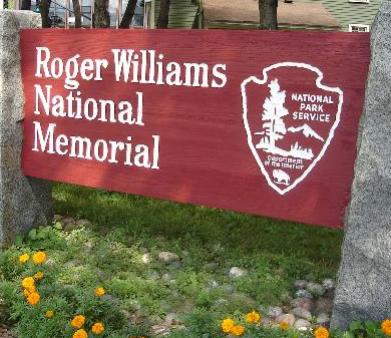 Roger Williams
Roger Williams stated that if God's people do repent, "He will restore His garden" protecting it as
"walled in peculiarly unto Himself
from the world."
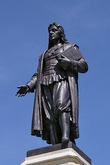
This became a foundational Baptist tenet, that the
government should be kept out of the church.
Baptist churches began in other colonies.
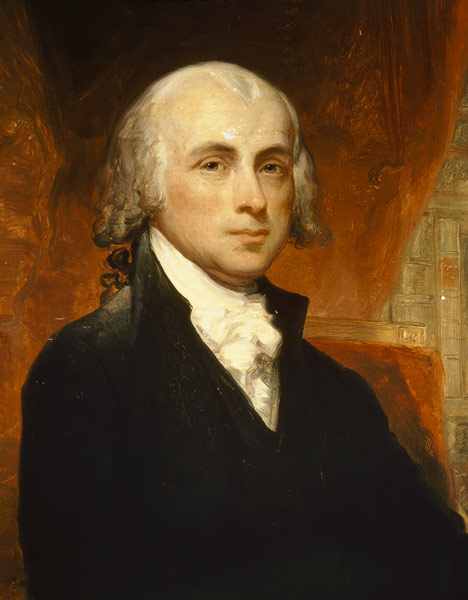 James Madison
James Madison wrote to Robert Walsh, March 2, 1819:
"The
English church was originally the established religion ...
Of other sects there were but few adherents, except the
Presbyterians who predominated on the west side of the Blue Mountains.
A little time previous to the Revolutionary struggle,
the Baptists sprang up, and made very rapid progress ...
At present the population is divided ... among the
Protestant Episcopalians, the
Presbyterians, the
Baptists and the
Methodists."
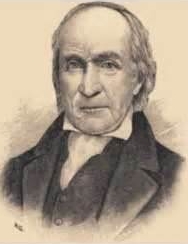 Baptist minister John Leland,
Baptist minister John Leland, who helped start the Baptist Churches in Connecticut, was instrumental in getting Baptists to support the election of
James Madison to the first session of Congress.
Leland delivered an enormous block of cheese to
President Jefferson from the citizens of Cheshire, Massachusetts, in 1802, after which he was invited to
address Congress on the topic of liberty of conscience and that the government should be separated from interfering with the church.
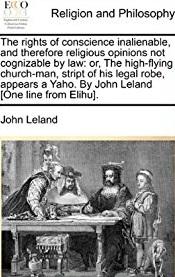
John Leland wrote in
Rights of Conscience Inalienable, 1791:
"Every man must give account of himself to God, and therefore every man ought to be at liberty to serve God in a way that he can best reconcile to his conscience.
If government can answer for individuals at the day of judgment, let men be controlled by it in religious matters; otherwise, let men be free."
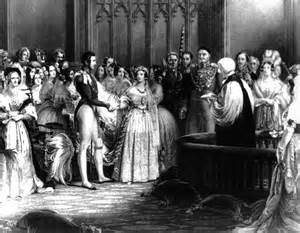
A short theological explanation is helpful to understand the mindset of these colonial founders.
The more you love someone, the more you want that someone to love you back.
God loves us infinitely and He has an infinite desire for us to love Him back. Deuteronomy 6:5 "Thou shalt love the LORD thy God with all thine heart, and with all thy soul, and with all thy might."
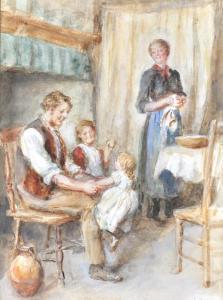
God does NOT
need our love, as He is not incomplete in any way, but He
wants it. (Exodus 34:14 "the LORD, whose name is Jealous, is a jealous God.")
Similarly, parents do not
need to have children, but they
want to, and when they do, they do not
need the children to thank them, but they do
desire some appreciation, affection, and fellowship.
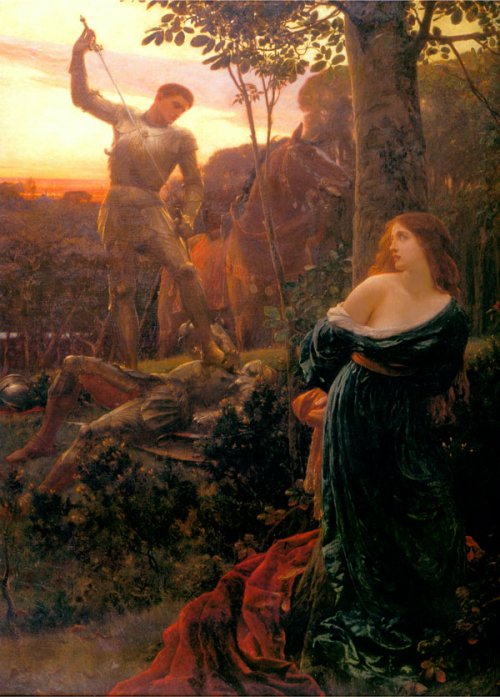
Throughout scripture,
Israel and the
church are referred to as the Lord's "bride."
Hosea 2:19-20 "And I will betroth thee unto me for ever; yea ... I will even betroth thee unto me in faithfulness: and thou shalt know the LORD."
II Corinthians 11:2 "For I am jealous over you with godly jealousy: for I have espoused you to one husband, that I may present you as a chaste virgin to Christ."
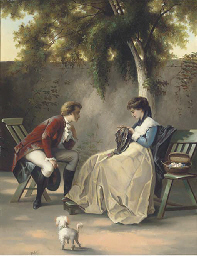
The dilemma is this, that love, by its very nature, must be
voluntary.
The moment it is forced, it is no longer love - it evaporates.
God wants our love, but He refuses to force it, for if He did, our response would no longer be love. It might be submission or obedience out of fear, but not love.
Like the pull of a magnet, God uses positive and negative motivations to influence our will, blessings and the withholding of blessings, grace and the withholding of grace, but He refuses to force a person's will.
He put the tree in the garden and told Adam and Eve not to eat from it, but He gave them the choice. He gave the children of Israel the Law, explaining the blessings and the curses, and told them to "choose life," but He gave them the choice.
All the rest of creation obeys God, but
only man can choose to love God.

To illustrate this, if a man twists his wife's arm and says, "tell me you love me," no matter what she says, she does not love him.
But if he courts and woos her with flowers, chocolate, dinner, and with self-sacrifice provides for her, defends her, protects her, and rescues her, then if out of the abundance of her heart she says "I love you," it means something.
God is not interested in submit or I will chop your head off, instead His desire is for us, by His grace, to voluntarily choose to surrender our will.
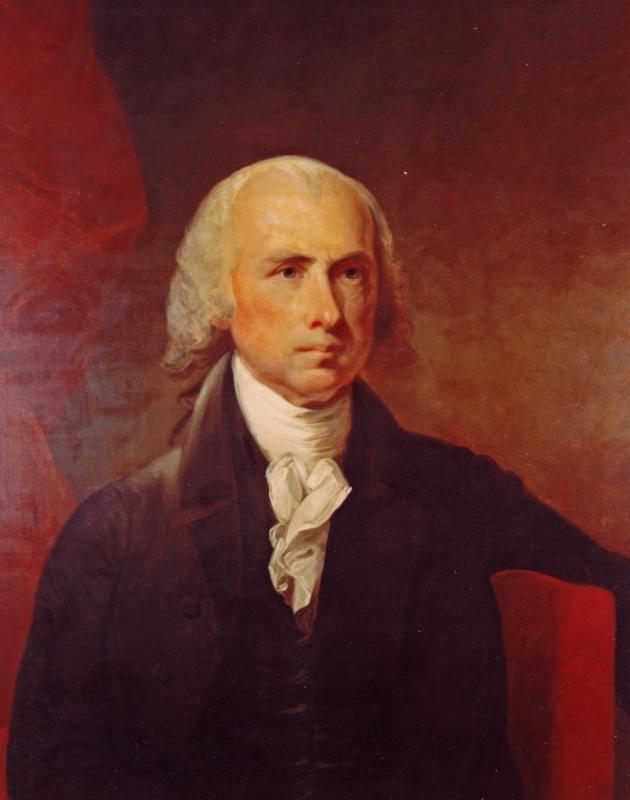
This was the understanding of Roger Williams and the colonial founders of Rhode Island.
President
James Madison expressed it in his National Proclamation of Public Humiliation and Prayer, July 23, 1813:
"If the public homage of a people can ever be worthy of the favorable regard of the Holy and Omniscient Being to whom it is addressed,
it must be ... guided
only by their free choice, by the impulse of their hearts and the dictates of their consciences ...
proving that
religion, that
gift of Heaven for the good of man, is
freed from all coercive edicts."
 THE ORIGINAL 13-A Documentary History of Religion in America's First Thirteen States
THE ORIGINAL 13-A Documentary History of Religion in America's First Thirteen States
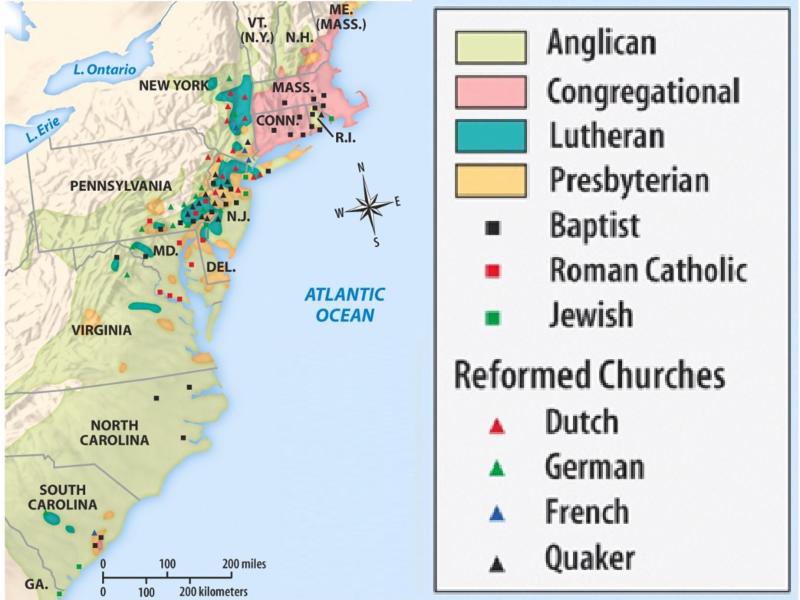
In his
Commentaries on the Constitution of the United States, 1833,
Justice Joseph Story stated:
"In some of the States,
Episcopalians constituted the predominant sect; in other,
Presbyterians; in others,
Congregationalists; in others,
Quakers ...
The whole
power over the subject of
religion is left exclusively to the
State governments."
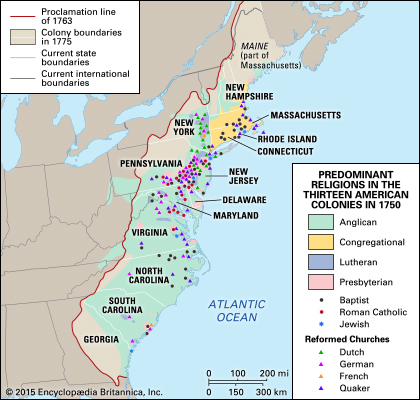
During North Carolina's Convention to ratify the U.S. Constitution,
Governor Samuel Johnston stated, July 30, 1788:
"I know but two or three States where there is the least chance of establishing any particular religion.
The people of
Massachusetts and
Connecticut are mostly
Presbyterians. In every other State, the people are divided into a great number of sects.
In
Rhode Island, the tenets of the
Baptists, I believe, prevail.
In
New York, they are divided very much; the most numerous are the
Episcopalians and the
Baptists.
In
New Jersey, they are as much divided as we are.
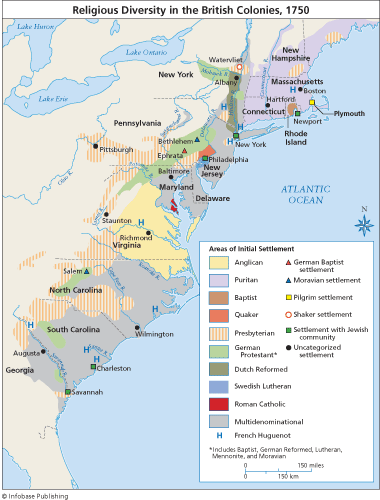
... In
Pennsylvania, if any sect prevails more than others, it is that of the
Quakers.
In
Maryland, the
Episcopalians are most numerous, though there are other sects.
In
Virginia, there are many sects; you all know what their religious sentiments are.
So in all the
Southern States they differ; as also
New Hampshire.
I hope, therefore, that gentlemen will see there is no cause of fear that any one religion shall be exclusively established."
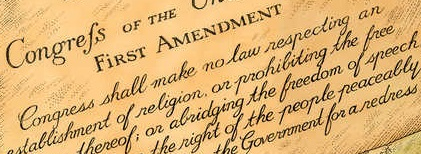
Though the
Federal Government was
prohibited by the
First Amendment from establishing a religion,
the State Governments were not.
John Bouvier's Law Dictionary (Philadelphia: J.B. Lippincott Co., 1889), stated in its definition of
Religion:
"The Constitution of the United States provides that
'Congress shall make no law respecting an
establishment of religion or
prohibiting the free exercise thereof.'
This provision and that relating to religious tests
are limitations upon the power of the Congress only ...
The Christian religion is, of course, recognized by the government, yet ... the
preservation of religious liberty is left to the States."
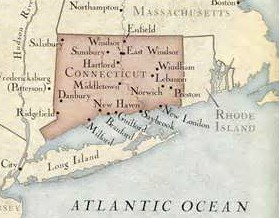
The
State of Connecticut had
established the
Congregational Christian denomination from its founding in
1636 by
Rev. Thomas Hooker till its first state constitution in
1818.
When Baptists moved into
Connecticut, the
Danbury Baptist Association complained to President Jefferson, October 7, 1801, of their second-class status:
"Sir ...
Our Sentiments are uniformly on the side of Religious Liberty
-That
religion is at all times and places a matter
between God and Individuals
-That
no man ought to suffer in name, person or effects
on account of his religious opinions
-That the legitimate
power of civil Government extends no further than
to punish the man who works ill to his neighbor:
But Sir ... our ancient charter (in Connecticut), together with the Laws made coincident therewith ... are; that ...
what religious privileges we enjoy (as Baptists) ... we enjoy
as favors granted, and
not as inalienable rights ..."
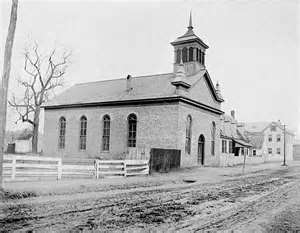 Danbury Baptists
Danbury Baptists continued:
"Sir, we are sensible that
the President of the united States is
not the national Legislator & also sensible that the national government
cannot destroy the Laws of each State;
but our hopes are strong that the sentiments of our beloved President, which have had such genial Effect already, like the radiant beams of the Sun, will shine & prevail through all these States and all the world till Hierarchy and Tyranny be destroyed from the Earth.
Sir ... we have reason to believe that America's God has raised you up to fill the chair of State ... May God strengthen you for the arduous task which Providence & the voice of the people have called you ...
And may the Lord preserve you safe from every evil and bring you at last to his Heavenly Kingdom through Jesus Christ our Glorious Mediator."
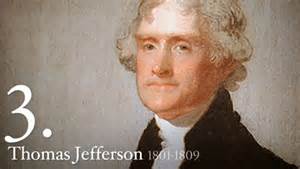
On January 1, 1802,
Jefferson wrote back agreeing with the
Baptists:
"Gentlemen ...
Believing WITH you
-that
religion is a matter which lies solely
between man and his God,
-that
he owes account to none other for
faith or his worship,
-that the legislative
powers of government reach actions only, and not opinions,
I contemplate with solemn reverence that act of the whole American people which declared that
their legislature should 'make no law respecting an establishment of religion, or
prohibiting the free exercise thereof,' thus building
a wall of separation between Church and State.
Adhering to this expression of the supreme will of the nation in behalf of
the rights of conscience, I shall see with sincere satisfaction the progress of those sentiments which tend to restore man to all his natural rights ...
I reciprocate your kind prayers for the protection and blessing of the common Father and Creator of man."
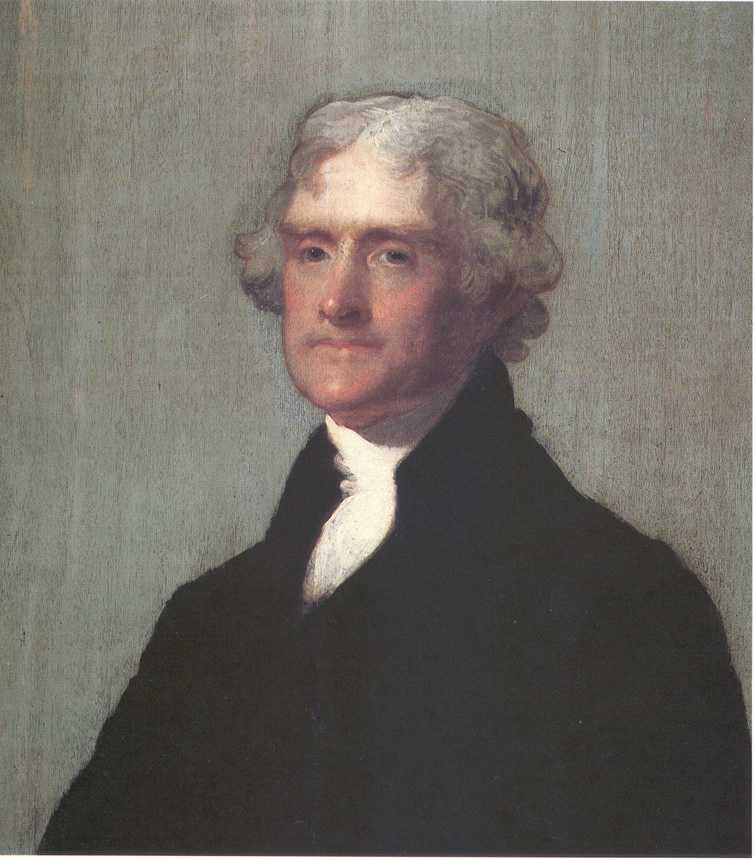
In his 2nd Inaugural Address, March 4, 1805,
President Jefferson stated:
"In matters of religion I have considered that
its free exercise is placed by the Constitution independent of the powers of the General (Federal) Government.
I have therefore undertaken, on no occasion, to prescribe the
religious exercise suited to it; but have left them, as the Constitution found them, under the direction and discipline of
State and Church authorities by the several religious societies."
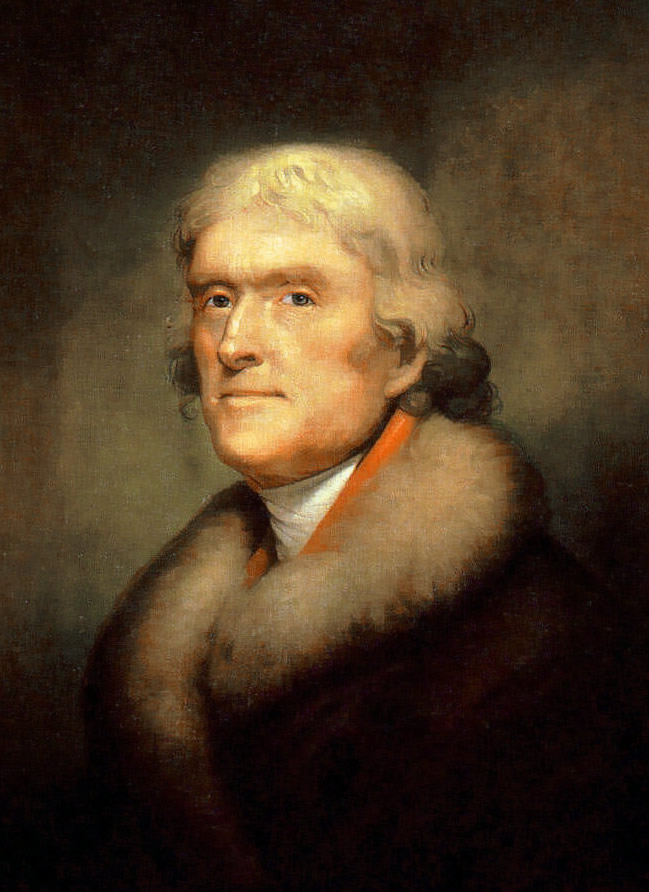 BACKFIRED-A Nation Born for Religious Tolerance No Longer Tolerates Its Founders' Religion
Jefferson
BACKFIRED-A Nation Born for Religious Tolerance No Longer Tolerates Its Founders' Religion
Jefferson wrote to Samuel Miller, January 23, 1808:
"I consider
the (Federal) government of the United States as interdicted (prohibited)
by the Constitution from inter-meddling with religious institutions, their doctrines, discipline, or exercises.
This results not only from the provision that no law shall be made respecting the establishment or free exercise of religion, but from that also which
reserves to the states the powers not delegated to the United States (Federal government) ..."
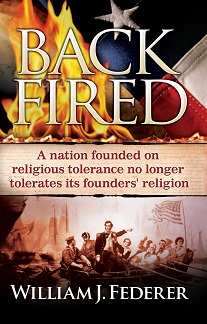 Jefferson
Jefferson continued:
"Certainly no power to prescribe any religious exercise, or to assume authority in religious discipline, has been delegated to the General (Federal) government. It must then
rest with the States as far as it can be in any human authority ...
I do not believe it is for the interest of religion to invite the civil magistrate to direct its exercises, its discipline, or its doctrines ...
Every religious society has a right to determine for itself the times for these exercises, and the objects proper for them, according to their own particular tenets."
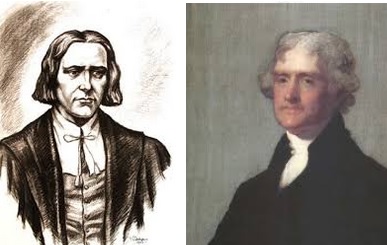
Agreeing with
Baptist Roger Williams' views regarding
rights of conscience, Jefferson wrote in his
Notes on the State of Virginia:
"Our rulers can have authority over our natural rights only as we have submitted to them. The
rights of conscience we never submitted, we could not submit.
We are answerable for them to our God."
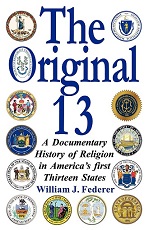 THE ORIGINAL 13 - A Documentary History of Religion in America's First Thirteen States
THE ORIGINAL 13 - A Documentary History of Religion in America's First Thirteen States